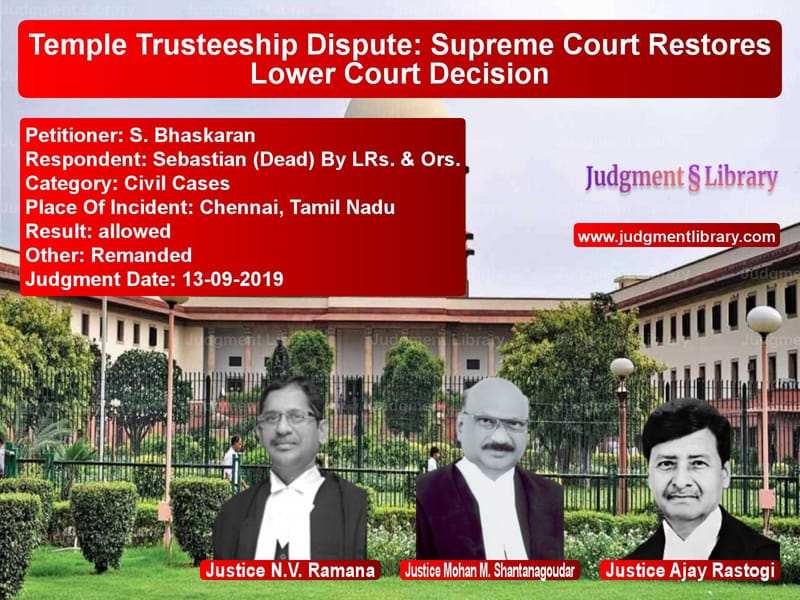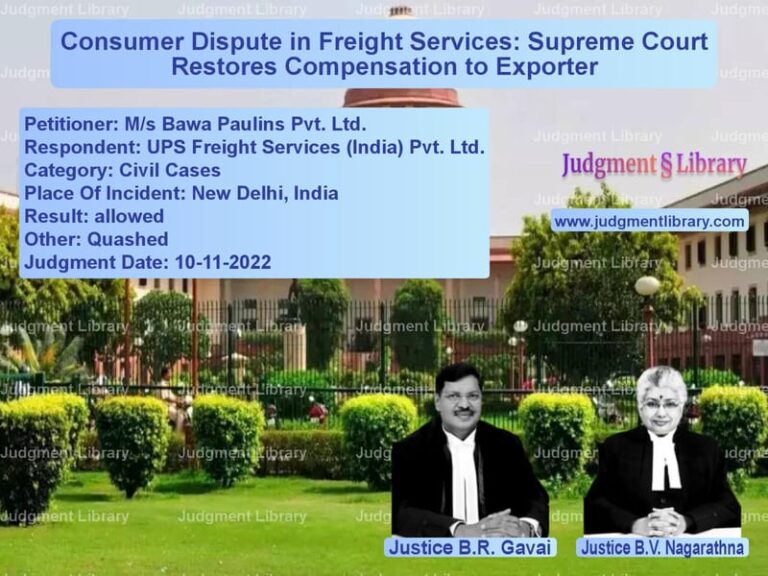Temple Trusteeship Dispute: Supreme Court Restores Lower Court Decision
The case of S. Bhaskaran v. Sebastian (Dead) By LRs. & Ors. revolves around a long-standing legal dispute over the trusteeship of a temple property in Chennai. The Supreme Court examined whether the High Court was correct in setting aside the execution proceedings in favor of the appellant, despite the fact that the lower courts had already ruled on the matter.
The Supreme Court ultimately ruled in favor of the appellant, restoring the City Civil Court’s order and reaffirming the legal principle that an executing court cannot go beyond the original decree. This judgment clarifies the scope of execution proceedings and prevents re-litigation of issues already decided in the original suit.
Background and Key Issues
The dispute originated when three brothers—Sadhasivamurthy, Balasundaram, and Sundararajan—settled temple properties via a deed dated September 19, 1947, stipulating that the eldest son of the deceased trustee would succeed him. The family lineage led to disputes over the rightful heir to the trusteeship.
Litigation commenced in 1987-88, with multiple suits filed concerning the temple’s management. The most relevant suit, O.S. No. 8664/1988, was filed by the appellant and his uncle as trustees, seeking an injunction against tenants in the temple properties.
The key legal questions before the Supreme Court were:
- Was the High Court correct in allowing an execution application challenging the trusteeship?
- Did the executing court have the jurisdiction to reassess the original decree?
- Should the decree in favor of the appellant be enforced as passed by the Trial Court?
Arguments of the Petitioner (S. Bhaskaran)
- The Trial Court had already determined that the appellant and his uncle were the trustees based on documentary evidence.
- The judgment was confirmed in first appeal, and no further appeal was filed, making the findings final.
- The execution application challenging the decree was an attempt to reopen the case and should be dismissed as non-maintainable.
- The High Court exceeded its jurisdiction by questioning the original decree in an execution proceeding.
Arguments of the Respondents (Legal Heirs of Sebastian & Others)
- The decree was obtained through fraud as the appellant had presented an heir certificate that omitted a rightful heir.
- Documents from 1948 and 1950 showed that Umapathymurthy, and not the appellant’s father, was the eldest son and rightful trustee.
- The execution court had the power to review the decree and prevent enforcement of a judgment obtained through misrepresentation.
- The High Court correctly intervened to prevent an erroneous decree from being executed.
Supreme Court’s Key Observations
1. Finality of the Original Judgment
“The judgment of the Trial Court, confirmed by the First Appellate Court, had attained finality. Since no further appeal was filed, the respondents were bound by it.”
The Court emphasized that once a case has been decided and no further appeal is pursued, the decision is binding on all parties.
2. Limited Scope of Execution Proceedings
“An executing court cannot travel beyond the order or decree under execution. The High Court exceeded its jurisdiction by questioning the validity of the decree in execution proceedings.”
The Supreme Court ruled that an execution court’s role is to enforce the decree, not reassess the merits of the original judgment.
3. Allegations of Fraud Must Be Raised in Appeal
“If the respondents believed that the decree was obtained through fraud, they should have challenged it in the appellate process, not in execution proceedings.”
The Court held that fraud allegations cannot be used as a basis to reopen a case during execution unless there is a clear jurisdictional basis for such a claim.
Final Judgment
The Supreme Court set aside the High Court’s judgment and ruled that:
- The City Civil Court’s order dismissing the execution application was restored.
- The decree in favor of the appellant should be enforced as passed.
- The execution proceedings must continue without interference from the High Court.
- The respondents cannot challenge the decree in execution after failing to appeal against the original judgment.
Impact of the Judgment
- Strengthens Finality in Litigation: Confirms that once a judgment attains finality, it cannot be reopened in execution proceedings.
- Clarifies the Role of Execution Courts: Limits the powers of execution courts to enforcing decrees rather than reassessing their merits.
- Prevents Re-litigation of Decided Issues: Ensures that parties cannot use execution proceedings as a backdoor method to challenge settled disputes.
- Encourages Proper Use of Appeals: Reinforces that fraud allegations should be raised in the appeal process and not in execution proceedings.
The Supreme Court’s decision ensures that judicial decisions remain final and binding, preventing unnecessary delays in the enforcement of decrees.
Petitioner Name: S. Bhaskaran.Respondent Name: Sebastian (Dead) By LRs. & Ors..Judgment By: Justice N.V. Ramana, Justice Mohan M. Shantanagoudar, Justice Ajay Rastogi.Place Of Incident: Chennai, Tamil Nadu.Judgment Date: 13-09-2019.
Don’t miss out on the full details! Download the complete judgment in PDF format below and gain valuable insights instantly!
Download Judgment: S. Bhaskaran vs Sebastian (Dead) By Supreme Court of India Judgment Dated 13-09-2019.pdf
Direct Downlaod Judgment: Direct downlaod this Judgment
See all petitions in Property Disputes
See all petitions in Succession and Wills
See all petitions in Judgment by N.V. Ramana
See all petitions in Judgment by Mohan M. Shantanagoudar
See all petitions in Judgment by Ajay Rastogi
See all petitions in allowed
See all petitions in Remanded
See all petitions in supreme court of India judgments September 2019
See all petitions in 2019 judgments
See all posts in Civil Cases Category
See all allowed petitions in Civil Cases Category
See all Dismissed petitions in Civil Cases Category
See all partially allowed petitions in Civil Cases Category







